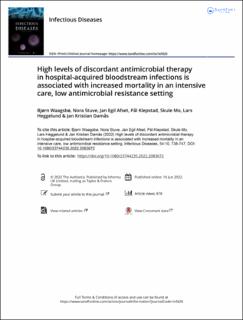High levels of discordant antimicrobial therapy in hospital-acquired bloodstream infections is associated with increased mortality in an intensive care, low antimicrobial resistance setting
Waagsbø, Bjørn; Stuve, Nora; Afset, Jan Egil; Klepstad, Pål; Mo, Skule; Heggelund, Lars; Damås, Jan Kristian
Journal article, Peer reviewed
Published version

Åpne
Permanent lenke
https://hdl.handle.net/11250/3040193Utgivelsesdato
2022Metadata
Vis full innførselSamlinger
- Department of Clinical Science [2318]
- Registrations from Cristin [9791]
Sammendrag
Background
Bloodstream infections (BSI) occur frequently and are associated with severe outcomes. In this study we aimed to investigate proportions of patients that received discordant empirical antimicrobial therapy and its association to mortality.
Methods
A retrospective cohort study model was undertaken to outline BSI in an intensive care, single centre, and low antimicrobial resistance prevalence setting. We used descriptive statistics to delineate proportions of patients that received discordant empirical antimicrobial therapy, and a correlation model and a logistic regression model to calculate the association with mortality and predictors of receiving discordant therapy, respectively.
Results
From 2014 to 2018 we included 270 BSI episodes, of which one third were hospital-acquired. Gram negative, Gram positive, and anaerobic pathogens were detected in 49.0%, 45.3% and 5.7% respectively. The proportion of isolates that conferred extended-spectrum beta-lactamase (ESBL) properties were 5.9% among enterobactereales, and no methicillin-resistant Staphylococcus aureus isolates were detected. Empirical antimicrobial therapy for community-acquired (CA) and hospital-acquired (HA) BSI were discordant at day 0 in 6.5% and 24.4%, respectively (p<.001). Discordant therapy was significantly associated with mortality at day 28 (p=.041). HA-onset BSI, enterococcal BSI and BSI of intraabdominal origin were statistically significant predictors of receiving discordant therapy.
Conclusion
A significant proportion of HA-BSI did not receive effective antimicrobial therapy and this was significantly associated with mortality. The results underscore the need for more accurate diagnostic tools, improved communication between the microbiological laboratory and the clinicians, and antimicrobial stewardship measures.
